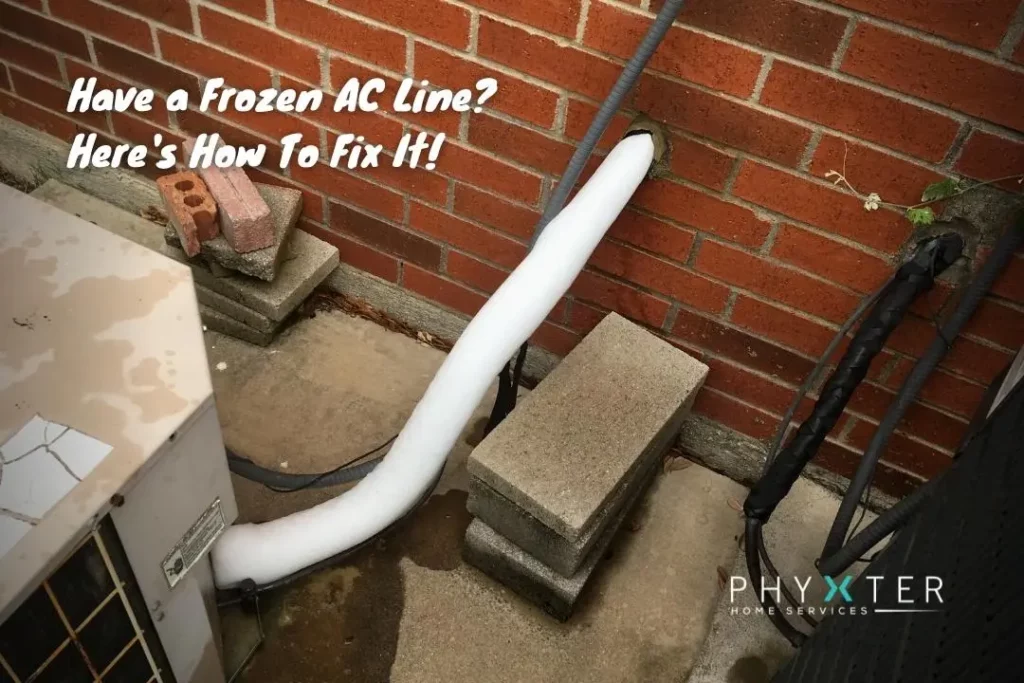Table of Contents
Have you noticed that your air conditioner isn’t pulling heavy-duty work the way it used to? Isn’t the air blowing out of the vent as cold as it used to be?
It can be highly frustrating to experience rising temperatures indoors in the middle of the summer, then go outside and discover an HVAC line is frozen. Does this sound familiar?
Read on to learn why an AC unit’s pipes may freeze, why you should take this problem seriously, and when it’s time for AC repair when you have a frozen AC line in your air conditioner.
❄️ Catch Air Conditioner Problems Early
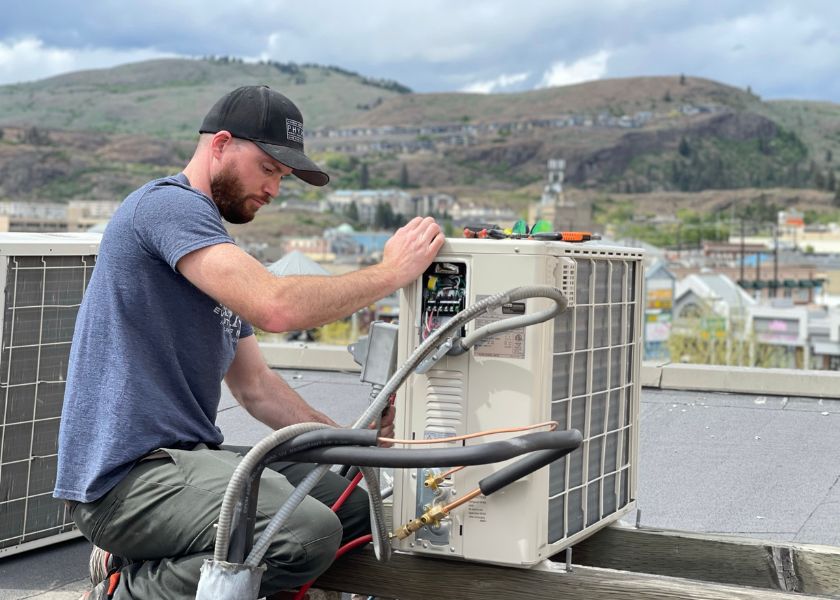
Sometimes, we ignore possible HVAC problems until they become too serious to brush aside. Pay attention to red flags in your HVAC system’s function, and you might avoid more complex and costly issues later on.
With ice buildup in the system, the first troubling sign is usually that the temperature inside your home doesn’t reach the thermostat setting. It may begin gradually and get worse over time.
Often, you will notice first that the upstairs areas of your home are warmer than they used to be, no matter how you adjust the thermostat.
If you suspect your air conditioner unit works less efficiently than before, try placing your hand over a supply register. Does the air that comes out feel warm? If so, the reason for the problem might relate to the evaporator.
Turn off the air conditioner and check the manufacturer’s instruction manual for a diagram that will help you access the evaporator. Look for frozen coils or any parts with a layer of ice on them.
If you notice any ice, it probably means that the cold liquid refrigerant flowing in your AC system is colder than 32 degrees F (or 0 degrees Celsius), which causes any moisture to freeze.
❄️ What Causes AC Lines to Freeze: Possible Reasons
When your AC system works properly, the refrigerant moves through the indoor unit’s evaporator coil collection of copper tubes, promoting heat absorption from the surrounding air and providing a cooling effect.
Several issues with the AC unit could interfere with the temperature exchange process. If this happens, the evaporator coil may absorb less heat and get too cold, leading to frozen refrigerant lines and ice accumulation.
So, what could cause an air conditioner line to freeze, especially on a broiling summer day? Chances are, your problem is either inadequate or low airflow through the evaporator or low refrigerant levels.
❌ Poor Airflow Over the Evaporator
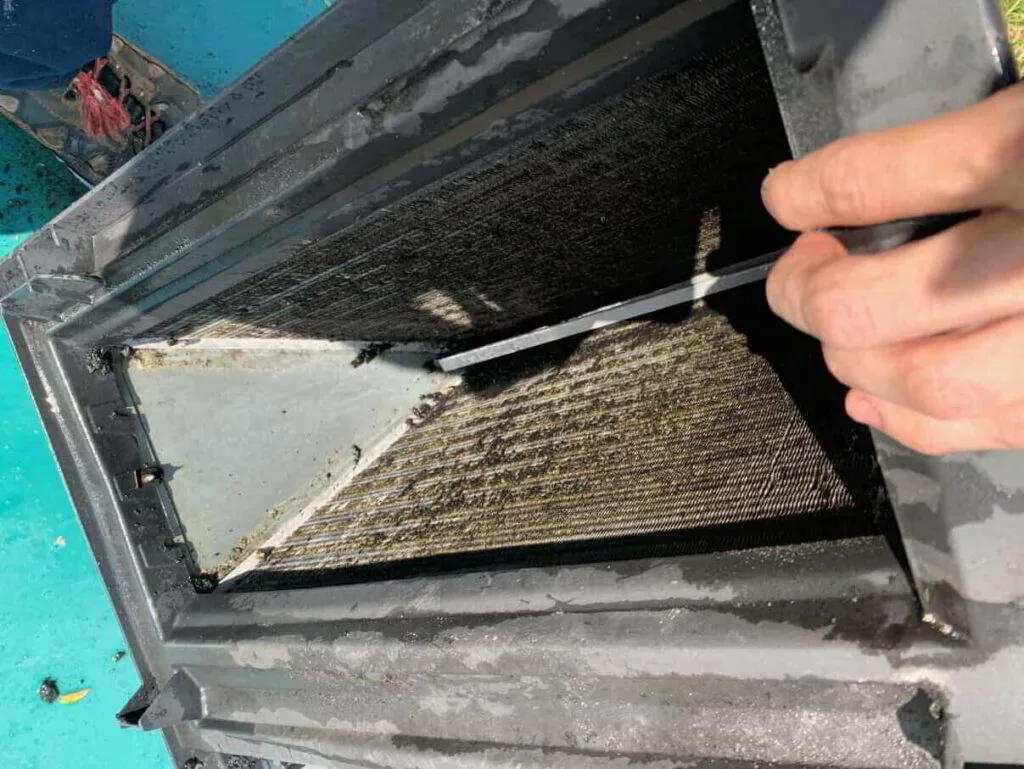
Your AC system needs unrestricted airflow at all times to function correctly. Once something obstructs the airflow, you can expect trouble.
Check out the list below and consider whether any of these problems could apply to your AC unit:
🏁 1. When did you last change your air filter?
In most homes, AC air filters need monthly changes to function optimally. With a clogged, dirty filter, air won’t flow as freely as before, and the condensate that forms on the evaporator coil on hot days may freeze.
🏁 2. Do you have any closed supply vents?
Some homeowners close supply vents in unused rooms, mistakenly believing it will result in higher AC efficiency and lower energy bills. Closing vents is usually a misguided strategy since a closed supply vent reduces airflow and causes the AC line to freeze.
🏁 3. Are any of your return vents blocked?
Return vents are important for good air circulation in your home. They pull the air in so that your air conditioner can cool or heat it. Closing vents is a nearly fail-proof recipe for AC unit malfunction.
🏁 4. Do the fan and blower work properly?
The fan works hard, sucking warm air into the AC and pushing cold air into the ductwork. If your fan or blower motor breaks down, not enough air will flow over the evaporator coil. In this situation, your AC will show decreased efficiency and possibly a frozen AC line.
🏁 5. Do you have a dirty evaporator coil?
When dirt blocks the evaporator coil, it interferes with proper air conditioning system function. Regular system maintenance can help you avoid evaporator coil clog-ups.
❌ Refrigerant Leaks
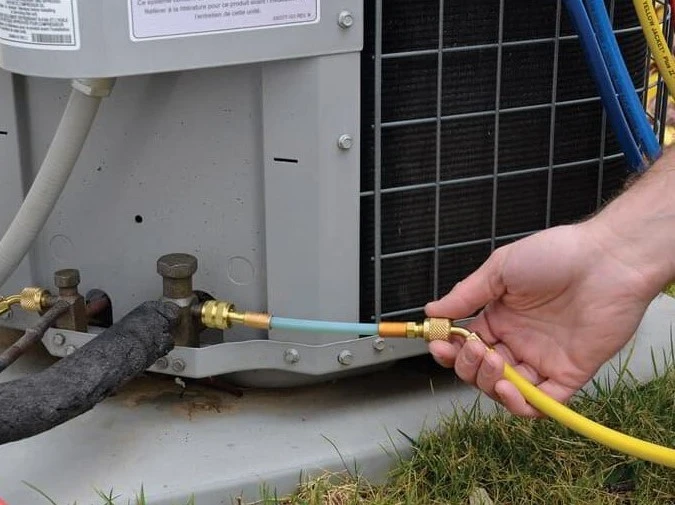
Refrigerant (or Freon) extracts heat from the air and forces it out through the outdoor condenser. A refrigerant leak could cause refrigerant levels to drop.
Once the refrigerant levels are low, the pressure within the refrigerant coils decreases, and the remaining refrigerant becomes colder, causing ice accumulation because of frozen moisture along the air conditioner’s refrigerant line.
With insufficient refrigerant, the AC system’s efficiency will plummet, and electricity bills may spike.
A freezing AC line, hissing sounds, and warm air coming out of the AC are all symptoms of a freon leak.
If low refrigerant is your air conditioner’s problem, an HVAC professional can empty the system of the remaining refrigerant, find the refrigerant leak, repair it, and refill the refrigerant.
🛑 NOTE: Refrigerant is a highly poisonous chemical, so you should never attempt to handle it yourself.
✅ How to Fix an AC with a Frozen Line?
First, avoid running your air conditioner unit if you suspect you’re dealing with a frozen evaporator coil or that the air conditioner pipe is frozen.
So, how do you fix a frozen AC line? While some quick DIY solutions could temporarily help you unfreeze your refrigerant line, your system needs expert maintenance to address the root cause of the problem.
Letting a professional deal with air conditioning repair saves a lot of time and frustration. Having said that, here are a few things you can try if you notice ice forming on AC lines.

How to Fix a Frozen AC Line
1. Thaw the Refrigerant Line
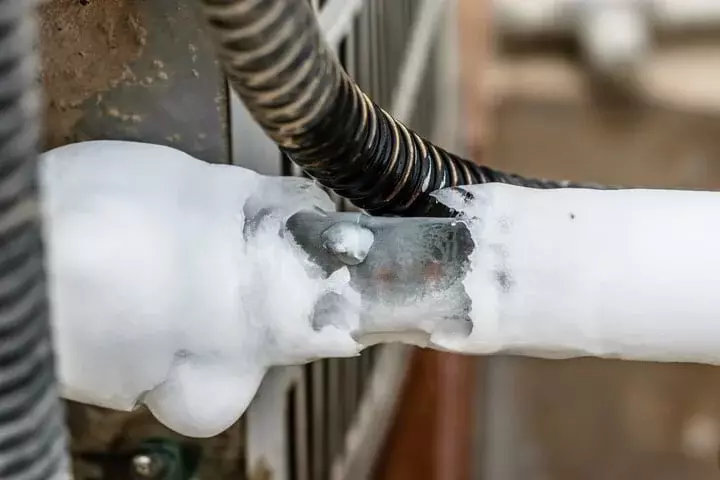
If you know how to unfreeze AC pipes, as a temporary fix, you could try thawing your AC unit.
Simply switch off the thermostat, turn the fan on, and wait for a few hours before turning your air conditioner back to cooling mode.
That may work for a while and protect your compressor from damage while you figure out what to do next, but if you haven’t fixed the underlying issue, your AC’s refrigerant lines may soon freeze again.
You could also use your electrical breaker box to turn off the power flow to your air conditioner, then wait for the ice to thaw. This slower thawing method may take up to 24 hours.
Also, prepare to collect all the water that accumulates during the thawing process, or your house may suffer from water damage.
It is best not to attempt clearing the ice manually since you could accidentally damage a delicate system part.
Once the ice has thawed, the evaporator coils need to dry. Turn on the blower and make sure the thermostat is still off. You could try to assist warm air flow with a hairdryer on a low heat setting.
How Long Does It Take for AC Pipes to Unfreeze?
Depending on the method you choose to thaw your AC pipes, the process can take as little as a few hours. However, if you wait for the AC pipes to thaw naturally, it can take as long as 24 hours.
2. Change the Air Filter
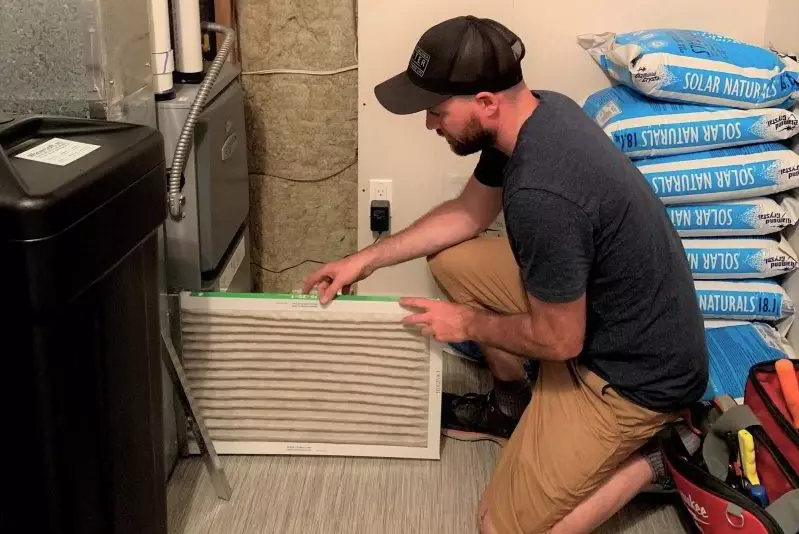
If you have a dirty air filter or haven’t changed it in a while, it’s time to do it now.
Changing the filter regularly (or washing it if you have a reusable filter) is important not just for air conditioning unit function but also for the air quality in your home.
3. Check Your Air Vents
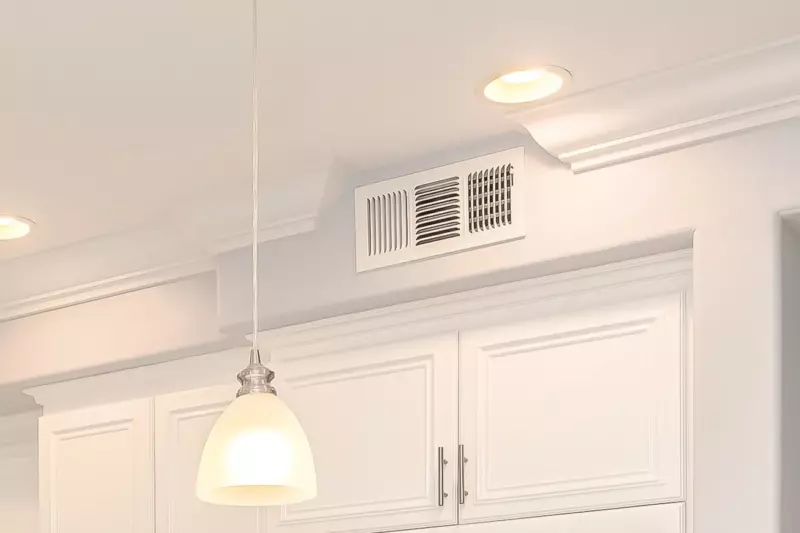
Ensure all the return and supply vents of your HVAC system are open, even in unused rooms.
Closing supply vents or return vents may obstruct airflow over the evaporator and interfere with the heat exchange.
Even if you didn’t intentionally close any supply vents, you might have inadvertently blocked the airflow with furniture, rugs, or household appliances.
Once you’ve got all the vents open, keep them that way.
Open vents mean lower pressure inside the ducts, more effective HVAC function, diminished cool air losses through ductwork leaks, and lower energy bills. Ching, Ching! 💲💲💲
📱 When To Call an HVAC Company
If the problem persists after you’ve thawed out your AC line, changed the filter, and ensured all the vents in your house are open, you know it’s time to make an appointment with an HVAC professional.
Apart from a general system inspection and checking for problems like a refrigerant leak and a dirty evaporator coil, here are some issues your HVAC expert may look into.
🧊 Blower Motor Problems
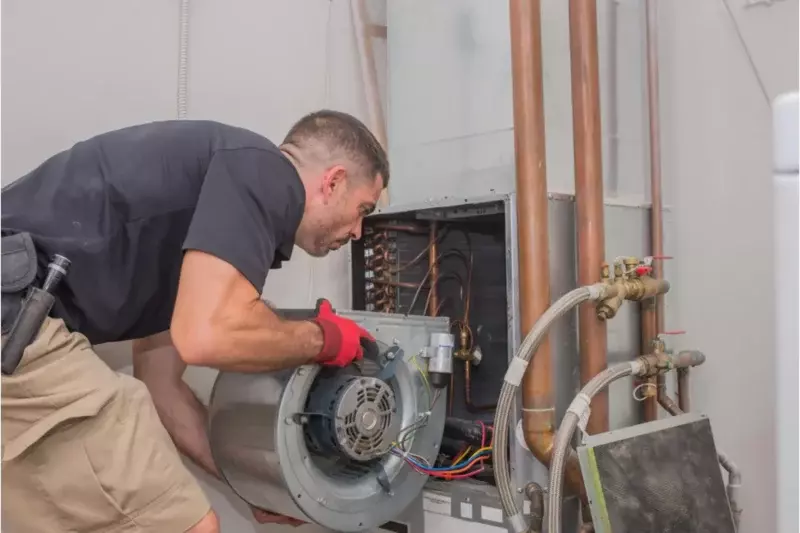
In most homes, AC air filters need monthly changing to function optimally.
With a clogged, dirty filter, air won’t flow as freely as before, and the condensate that forms on the evaporator coil on hot days may freeze.
- The blower fan spinning unusually slowly
- Erratic or clunky fan motion while starting the system
- A loud humming noise
- No warm air flowing outside
🧊 Collapsed or Torn Air Ducts
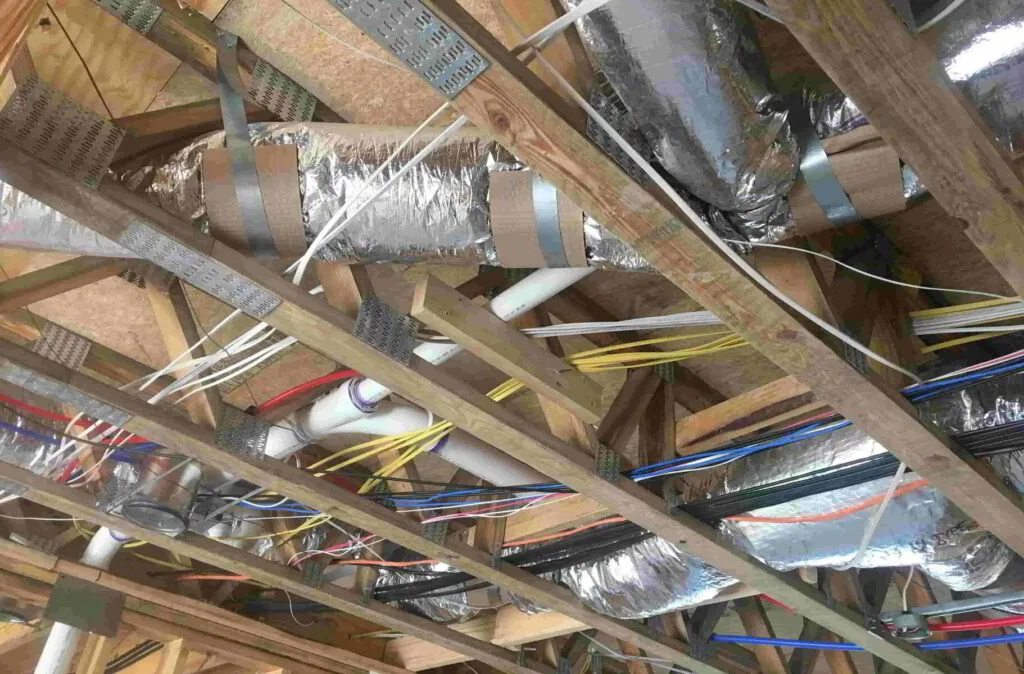
A torn or collapsed air duct will interrupt airflow over the evaporator coil.
An HVAC expert will check the air ducts for leaks and tears, especially along the duct joints and other damage-prone places, and seal up any cracks.
Signs of air duct leaks include:
- Unusually high utility bills
- Uneven cooling and heating, even on the same floor
- A dusty home if dust from the basement, attic or other unused spaces is pulled into the duct
Related Reading: Homeowners Guide to Ductwork Sealing
How to Prevent AC Pipes from Freezing
If your AC condenser line is frozen at any point, you likely have a lot of questions. One of the questions you’re likely asking yourself at this point is, “How do I stop my AC pipes from freezing?”
If you know the potential answers to the question, “Why is my AC line frozen,” you can start trying to combat them before freezing happens.
Here are some ways to prevent your HVAC pipe from being frozen:
1- Maintain Adequate Insulation
To ensure that your AC unit pipe will not be frozen, ensure that your HVAC pipes are adequately insulated.
2- Seal Air Leaks
Ensure that any gaps where pipes enter and exit are sealed. Your air conditioner line can get frozen if they have to deal with sudden temperature fluctuations.
3- Regular Maintenance
To prevent your AC unit line from becoming frozen, ensure that your air conditioner is maintained regularly. A professional maintenance service can help to ensure that your AC unit is in optimal condition, no matter what you throw at it.
4- Consider Adding Heating Tape
If you don’t want your central air to have a frozen line, you could consider adding heating tape to the pipes and lines. This will prevent them from freezing in cold weather.
5- Insulate Exposed Pipes Outdoors
If your AC line is frozen outside the house, this may not be unusual (depending on your climatic conditions). Finding that your air conditioner has a frozen pipe outside may not be unusual if the weather has been below freezing, for instance. So, to prevent your outside AC line from being frozen, ensure that all lines and pipes are well insulated.
6- Professional Inspection
If you find that an AC line is frozen inside the house, it’s time to call in a professional. This is because ice on an air conditioner pipe inside is generally a sign of a more severe problem rather than temperature-related causes. So, to prevent your home AC line from being frozen, ensure that your AC unit undergoes regular professional inspections.
Need AC Repair? Fix It With Phyxter

Have you encountered frozen AC lines or other HVAC issues? Are you thinking with horror about a hot summer with a faulty AC system? When HVAC systems run into problems, Phyxter Home Services comes to the rescue.
We make it simple to get multiple quotes from vetted HVAC service contractors in your area.
Are you looking for a new replacement filter? Then, check out our next article and choose the right filter for your home: Air Filter Guide. What MERV Rating Do I Need For My Home?
We have you covered if you live in North or Central Okanagan. For more information, visit our Vernon or Kelowna AC service pages. We offer a range of AC Services and that perfect HVAC technician that can save you money and keep your family comfortable.

